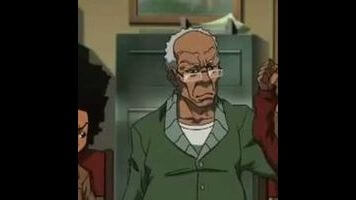The Boondocks: “Freedomland”

The worst thing satire can be is predictable. Some types of humor work by fulfilling expectations in highly predictable fashion—mostly jokes like a character saying something along the lines of, “I’ll never fly again!” followed by an immediate cut to them white knuckling the armrests on a plane—but pointed political sendups definitely don’t work that way. The best satire teaches something and sends the viewer away with new questions, which it accomplishes by placing familiar dynamics, people, and symbols in new, surprising, often heightened contexts. This is also why most satire is bad—being fresh is hard, especially when everyone thinks of the same few jokes about every political dustup. Tonight’s Boondocks follows through on almost all of the easiest jokes inherent in its premise, and while some of them still manage to be funny (largely by following through on some of our expectations), the majority of “Freedomland” manages to take a solid premise and fritter it away.
That premise—that the Freemans have become slaves playing slaves at a giant historical amusement park owned by Eddie Wuncler—is the logical conclusion of the end of “Good Times.” We’ve spent the last few filler episodes watching Robert try in vain to make back the money he owes, waiting for the other shoe to drop, and drop it does. The perhaps too-pointedly named Freedomland is something out of a George Saunders story—a giant, horrifying consumerist monstrosity transmuting horrible experiences for millions of people into a well-marketed product for the entertainment and distraction of others. (I’m especially thinking of CivilWarLand In Bad Decline here.) The idea that tons of people would actually pay for the pleasure of whipping slaves or shooting water pistols at a face-painted black child in a “historical” setting is both intriguing and discomforting, which makes it perfect for this show. But other than the occasional glimpses of happy families enjoying the premises, the episode is focused squarely on the plight of the Freemans without considering the broader implications of a world in which Freedomland (and the slavery required to fuel it) can actually exist.
At least we got a Huey episode, though! “Freedomland” is the biggest showcase the character has had all season—he even provides narration. But Rodney Barnes uses Huey as a mouthpiece for complaints about the one percent and to agitate for a slave revolt that seems almost perfunctory as the conclusion of the episode, without couching his actions in any of the specific things that make him more than a collection of stereotypes. Somehow, Huey has the most action he’s had in a while in this episode and still seems like a nagging buzzkill in elements like his clunky, ham-handed voiceover describing Robert’s current state: “What was once a productive senior citizen is now reduced to a couch potato.” For all that I’ve been agitating for a Huey episode, maybe I should have clarified that I wanted a good Huey episode, one that treated him as more than a collection of platitudes and karate kicks—kicks which aren’t even that great, though we’ll get to it later.
It’s not like the other characters fare too much better, with the exception of Robert, who manages to show some spine (even if he also utters a cowardly “Yeah, boy!”) and actual paternal instinct toward his grandchildren. Tom, who actually applies to be a slave, has been taken to pretty much the literalization of his namesake—his interactions with Ruckus just skirt being explicit with this, especially when he abandons the Freemans after Sarah buys his freedom (I wish that reunion had taken place in the episode). Ruckus is, in turn, another problem, as he has been all season. His continued assertions to the Freemans that he won’t hesitate to shoot them violate his established characterization, especially his genuine belief that white people know what’s best for black people—he argues vociferously for the greatness of Freedomland at the end of the episode, but proves more than willing to kill the people he’s supposed to be helping.








































